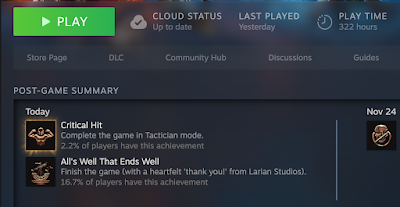I finished Dungeons & Dragons, Baldur's Gate 3 last night. I've played 322 hours of that game since May, compared to an average of 88 hours a year with friends around the table. I haven't watched a movie since starting this game and it has dominated my free time. It is an example of brand management, taking the game I love and managing it across various platforms with the hopes of turning that creativity into money. Wizards of the Coast's Q3 profits were up 99% because of BG3, along with other brand extensions, including Lord of the Rings Magic and Warhammer 40K Magic. Brand management is also at the heart of my professional problems. I shall elaborate.
I love games. Game designers are passionate about making games. Every successful company in this trade has found a balance between the passion of game design and the very difficult business of the game trade. Go through Shannon Applecline's history of role playing games and the same balancing act plays out, decade after decade. You can be passionate, but without business sense, you will fail.
The problems occur when our beloved games are managed by large, corporate entities. These entities have passionate designers, at least at the moment of design, but the power in the company is with the executives, the brand managers. Brands must perform, more so than just smart business in the game trade. The game itself takes a back seat to the potential of the property.
Brands aim to extend, leverage, and exploit properties, previously known as games. Brands will take a rounding error like D&D, which we love, and coddle, protect and feed it just enough to maintain it in the public eye, in hopes of a more profitable brand venue. D&D is devalued, de-contented and sold at close to a loss for maximum peak public awareness. That's how you build a brand. It's also how you strangle a game.
This brand management sounds terrible, until you get a gem like Baldur's Gate 3. BG3 is successful brand management, which happily resulted in a great, creative game. It's the best video game I've ever played. It's a wonder of game design. It has made me better at tabletop D&D. It will occasionally fall on its face, but that's just game design pushing the limits, something tabletop D&D, intent on careful brand management, hasn't done in perhaps 20 years.
You don't get creativity with place holder brands. With brand management comes vanilla brand self preservation. Real employees make money for the brand, while creatives are contractors, hired to write middle of the road, safe content, for when there's a need for the brand to maintain public awareness. It's pretty awful and the community takes up most of the slack in both creativity and on boarding players.
The modern game trade is dominated by brand management, not in the number of companies but in the percentage of sales by top publishers. We don't speculate so much about the content of the next Magic set as much as we do about how (not whether) Wizards of the Coast will manipulate supply. We don't worry whether Asmodee will develop a great Star Wars CCG, because we know the fantastic designers will do a great job. Instead we worry how Asmodee's brand management will tank this game through various missteps that might keep that game relevant with consumers. I have no idea how popular Games Workshop's Warhammer 40K game actually is, only that my turn rates are fantastic due to short supply from tight allocations, under production, and channel strangulation. My metrics say it's a winner, so probably? Starvation can be mistaken for fitness.
All of this has nothing to do with the actual quality of the game, only how corporations self perpetuate and maximize shareholder value. By the time a game player has achieved peak disillusionment, they are likely on to families and home ownership and other peaks of life's disillusions. This was stressed in a recent video by Matt Colville, who discusses brands versus games when it comes to D&D. As a store owner, I'm still here, selling these games, as a disillusioned brand champion, to the kids of the disillusioned. I shouldn't care, because the money is good, but as a player of games? It makes me sad and if dealing with the public hasn't crushed your soul, brand management certainly will give its all.
I am not guilt free in this charade. I embrace the brands just as hard as anyone. When 80% of my RPG sales come from 20% of my D&D product, I might still bring in a slew of indie RPGs, but who am I kidding? It's all about the D&D. I would love a miniatures game replacement for 40K or a CCG alternative to Magic. The truth is those brands are solid, even when the game falters, even when they load balance gender in D&D books rather than write progressive content. Brands can screw around and not find out, something small publishers can't get away with.
Anyway, I shall now slink back to my corporate lair and prepare for my next D&D game, like the hypocrite I am.


No comments:
Post a Comment